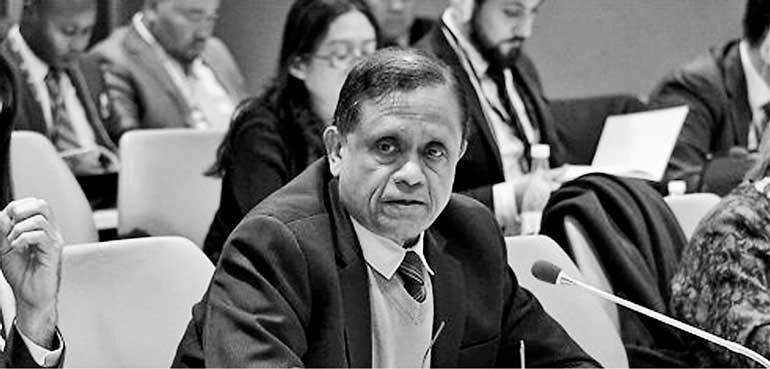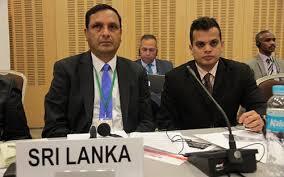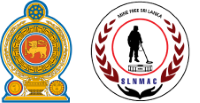Advocacy
Advocacy refers to activities undertaken to mobilize support for mine action and to convince Member States to accede, ratify and implement the Anti-Personnel Mine Ban Convention (APMBC), the Convention on Cluster Munitions (CCM), the Convention on Certain Conventional Weapons (CCW) and other relevant international agreements such as the Convention on the Rights of Persons with Disabilities (CRPD).
Sri Lanka demonstrated its commitment to international humanitarian efforts by acceding to the Anti-Personnel Mine Ban Convention (APMBC) on December 13, 2017, with the convention entering into force on June 1, 2018.

Shortly thereafter, on March 1, 2018, the country acceded to the Convention on Cluster Munitions (CCM), becoming the first South Asian nation to do so, just under three months after joining the APMBC. The CCM came into force for Sri Lanka on September 1, 2018.
Additionally, Sri Lanka is a party to the Convention on Certain Conventional Weapons (CCW), aimed at restricting or eliminating the use of specific types of conventional weapons that can cause excessive harm.
In alignment with its commitment to humanitarian principles, Sri Lanka has also ratified the Convention on the Rights of Persons with Disabilities (CRPD) on February 8, 2016, emphasizing its dedication to safeguarding and promoting the rights of persons with disabilities, including those affected by landmines and other explosive remnants of war (ERW).
Sri Lanka Campaign to Ban Landmines (SLCBL) is the National Campaign advocating for a total ban on Antipersonnel Landmines in Sri Lanka. SLCBL is a member of the International Campaign to Ban Landmines (ICBL), 1997 Nobel Peace Prize Co-Laureate, a leading civil society movement banning antipersonnel (AP) landmines in the world.
Since 2009, the South Asia Small Arms Network (SASA Net) - Sri Lanka functions as the secretariat for the Sri Lanka Campaign to Ban Landmines (SLCBL). SLCBL has successfully initiated dialog with the Ministry of External Affairs, Ministry of Defense, Ministry of Health Services & the Ministry of Social Services on the issues of Anti-personnel Landmines, Trap Guns, Cluster Munitions, use of victim activated devices and more generally use of explosives by unauthorized persons and the need for necessary domestic legislations. SLCBL has included banning AP landmines, cluster munitions, ERW’s and Trap Guns including Risk Education and supporting victims in the campaign mandate. Furthermore, SLCBL/SASA Net’s main focus is on equal access, opportunities and services for people with disabilities.
The initiative to ban anti-personnel mines by the Government of Sri Lanka (GoSL) and the LTTE began in 1999 under the auspices of the Inter Religious Peace Foundation (IRPF), a movement for peace and reconciliation led by religious leaders.
In 2003, the Landmine Ban Advocacy Forum (LBAF) was established, comprising UN agencies, like-minded governments, and mine action stakeholders such as UNDP, UNICEF, UNHCR, and international and non-governmental organizations involved in mine action and aid relief. LBAF operated under the Consortium of Humanitarian Agencies (CHA), with the Inter Religious Peace Foundation (IRPF) included as a member and representatives from the Ministry of Foreign Affairs (MFA) and the Humanitarian Demining Unit (HDU) of the Sri Lanka Army (SLA) participating as observers.
In 2005, LBAF successfully lobbied the Government of Sri Lanka (GoSL) to submit a Voluntary Article 7 Transparency Report to the Ottawa Treaty States Parties and encouraged Sri Lanka to become a party to the Convention on Certain Conventional Weapons (CCW) and its protocols, including Optional Protocol II (Protocol V entered into force in 2006). The forum also conducted extensive media engagement through press releases, briefings, and training sessions on the landmine issue. Additionally, LBAF collaborated on joint programs with GoSL, UNDP, and UNICEF, launched mass media campaigns across print and electronic platforms, and established the Eminent Persons Group in late 2007.
Since February 2009, the current Sri Lanka Campaign to Ban Landmines (SLCBL) was established informally, receiving administrative and secretarial support from the South Asia Small Arms Network (SASA Net), an organization advocating for the control and ban of illegal small arms and trap guns. SASA Net acts as the lead agency for SLCBL. In collaboration with other interested organizations, SASA Net took steps to formalize SLCBL, aiming to partner with all mine action stakeholders, including state entities, while conscientiously navigating the security and political landscape of the time.
